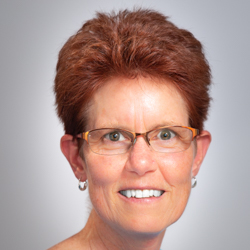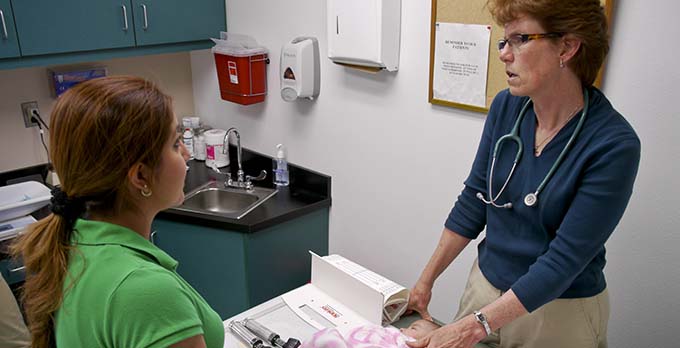Say cheese! A healthy smile doesn’t just make for flattering photographs. Your smile can provide a picture of your overall health.
A growing body of research shows that poor oral health can indicate other health problems in the body or make these conditions worse. Oral health is an area that, historically, primary care providers haven’t addressed. Primary care providers can serve as a front-line defense to improve oral health and in turn, overall health, especially for patients who can’t regularly access a dentist.
“Oral health is part of your overall health,” said Christine Cogil, DNP, RN, FNP-BC, interim assistant dean of Professional Graduate Programs and associate professor at The University of New Mexico College of Nursing. “If you take care of your mouth, you'll likely take care of the rest of your body.”
Cogil was recently selected as New Mexico’s oral health champion as part of The Center for the Integration of Primary Care and Oral Health’s 100 Million Mouths Project. The center is selecting one oral health champion in each U.S. state. These champions work with health care education programs to incorporate oral health into courses for nurses, nurse practitioners, doctors and physician assistants. The goal is to build a nationwide work force of health care providers equipped to provide preventive care education and assess for – and in some cases, manage – oral health issues.
The initiative hopes to impact the oral health of at least 100 million mouths in the United States by educating current students. These future health care professionals will be able to talk about oral health in their own networks, expanding the number of primary care providers working with their patients’ oral health.
Cogil is now working to connect with health care programs across the state to understand how oral health is currently included in their curriculum and how it can be expanded.

I'm just one person, and when I see a few patients or I talk to a few students, I make one small impact, but if I can share this information with others, perhaps we can reach more people.
“I'm just one person, and when I see a few patients or I talk to a few students, I make one small impact, but if I can share this information with others, perhaps we can reach more people,” Cogil said.
“That's the whole idea behind the 100 Million Mouths campaign,” she said. “There's just one person, but one person reaches out to another, and they reach to more, and they reach to more, until you have really made an impact. At some point, there is a tipping point that really makes people aware that your mouth and your oral health is part of overall well-being.”
Researchers are increasingly finding connections between oral health and problems in other parts of the body, Cogil said. For example, diabetes can cause inflammation of the gums in the mouth. This inflammation causes an increase in blood sugar, which exacerbates diabetes and in turn increases inflammation in the gums, creating a vicious cycle.
Surgeons and oncologists increasingly are requesting oral health exams before starting surgery or treatment to ensure oral infections don’t cause inflammation elsewhere in the body or overpower a weakened immune system.
Integrating oral health into primary care is particularly important in rural New Mexico, where there are fewer dental providers. Compared to the state’s metropolitan areas, residents in rural communities often have to travel farther for dental care and might experience difficulty getting an appointment for preventive dental care. Cogil said rural primary care providers in particular can evaluate oral issues to catch problems early on, before they get worse, or offer health advice to prevent them all together.
Cogil has been working to integrate dental health into primary care for much of her career as a nurse practitioner. She holds a joint appointment within the UNM College of Nursing and the School of Medicine’s Department of Dental Medicine.
She has previously worked with Navajo Department of Health via a Health Resources and Services Administration grant to integrate oral health into the care of pregnant women and newborns on Navajo Nation, and she’s created and hosted community trainings, educational materials and assessment tools to help primary care providers integrate oral health into their work.
“I'm really, really happy to be selected,” she said. “It's an opportunity to carry on the work that I've been doing locally to other schools on UNM’s Health Sciences campuses and around the state.”
